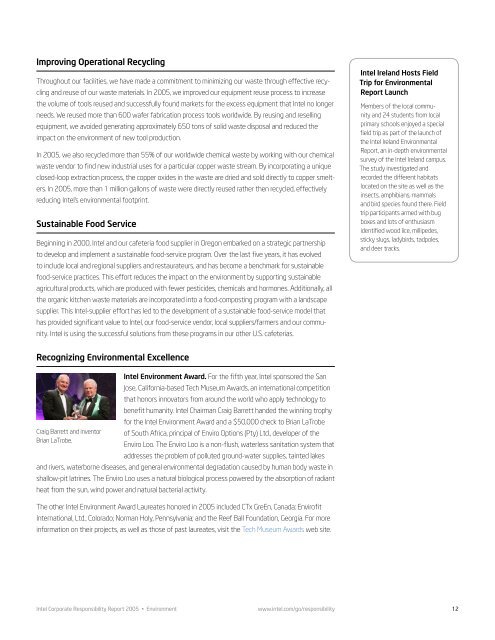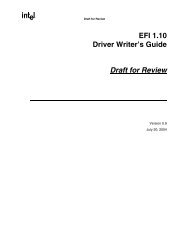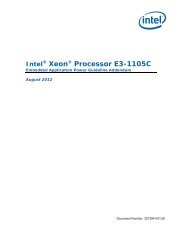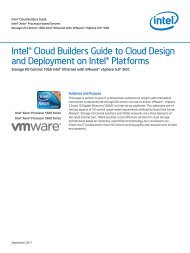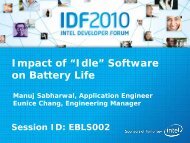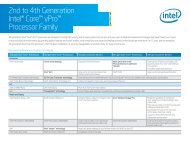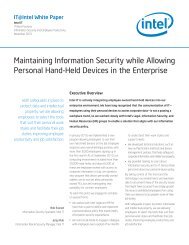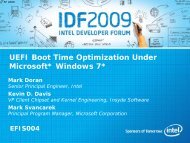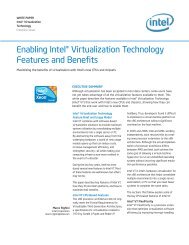Download - Intel
Download - Intel
Download - Intel
You also want an ePaper? Increase the reach of your titles
YUMPU automatically turns print PDFs into web optimized ePapers that Google loves.
Improving Operational Recycling<br />
Throughout our facilities, we have made a commitment to minimizing our waste through effective recycling<br />
and reuse of our waste materials. In 2005, we improved our equipment reuse process to increase<br />
the volume of tools reused and successfully found markets for the excess equipment that <strong>Intel</strong> no longer<br />
needs. We reused more than 600 wafer fabrication process tools worldwide. By reusing and reselling<br />
equipment, we avoided generating approximately 650 tons of solid waste disposal and reduced the<br />
impact on the environment of new tool production.<br />
In 2005, we also recycled more than 55% of our worldwide chemical waste by working with our chemical<br />
waste vendor to find new industrial uses for a particular copper waste stream. By incorporating a unique<br />
closed-loop extraction process, the copper oxides in the waste are dried and sold directly to copper smelters.<br />
In 2005, more than 1 million gallons of waste were directly reused rather then recycled, effectively<br />
reducing <strong>Intel</strong>’s environmental footprint.<br />
Sustainable Food Service<br />
Beginning in 2000, <strong>Intel</strong> and our cafeteria food supplier in Oregon embarked on a strategic partnership<br />
to develop and implement a sustainable food-service program. Over the last five years, it has evolved<br />
to include local and regional suppliers and restaurateurs, and has become a benchmark for sustainable<br />
food-service practices. This effort reduces the impact on the environment by supporting sustainable<br />
agricultural products, which are produced with fewer pesticides, chemicals and hormones. Additionally, all<br />
the organic kitchen waste materials are incorporated into a food-composting program with a landscape<br />
supplier. This <strong>Intel</strong>-supplier effort has led to the development of a sustainable food-service model that<br />
has provided significant value to <strong>Intel</strong>, our food-service vendor, local suppliers/farmers and our community.<br />
<strong>Intel</strong> is using the successful solutions from these programs in our other U.S. cafeterias.<br />
<strong>Intel</strong> Ireland Hosts Field<br />
Trip for Environmental<br />
Report Launch<br />
Members of the local community<br />
and 24 students from local<br />
primary schools enjoyed a special<br />
field trip as part of the launch of<br />
the <strong>Intel</strong> Ireland Environmental<br />
Report, an in-depth environmental<br />
survey of the <strong>Intel</strong> Ireland campus.<br />
The study investigated and<br />
recorded the different habitats<br />
located on the site as well as the<br />
insects, amphibians, mammals<br />
and bird species found there. Field<br />
trip participants armed with bug<br />
boxes and lots of enthusiasm<br />
identified wood lice, millipedes,<br />
sticky slugs, ladybirds, tadpoles,<br />
and deer tracks.<br />
Recognizing Environmental Excellence<br />
Craig Barrett and inventor<br />
Brian LaTrobe.<br />
<strong>Intel</strong> Environment Award. For the fifth year, <strong>Intel</strong> sponsored the San<br />
Jose, California-based Tech Museum Awards, an international competition<br />
that honors innovators from around the world who apply technology to<br />
benefit humanity. <strong>Intel</strong> Chairman Craig Barrett handed the winning trophy<br />
for the <strong>Intel</strong> Environment Award and a $50,000 check to Brian LaTrobe<br />
of South Africa, principal of Enviro Options (Pty) Ltd., developer of the<br />
Enviro Loo. The Enviro Loo is a non-flush, waterless sanitation system that<br />
addresses the problem of polluted ground-water supplies, tainted lakes<br />
and rivers, waterborne diseases, and general environmental degradation caused by human body waste in<br />
shallow-pit latrines. The Enviro Loo uses a natural biological process powered by the absorption of radiant<br />
heat from the sun, wind power and natural bacterial activity.<br />
The other <strong>Intel</strong> Environment Award Laureates honored in 2005 included CTx GreEn, Canada; Envirofit<br />
International, Ltd., Colorado; Norman Holy, Pennsylvania; and the Reef Ball Foundation, Georgia. For more<br />
information on their projects, as well as those of past laureates, visit the Tech Museum Awards web site.<br />
<strong>Intel</strong> Corporate Responsibility Report 2005 • Environment<br />
www.intel.com/go/responsibility<br />
12


